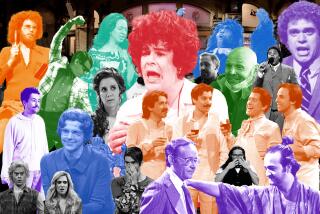Young Filmmakers and Musicians Create a New Revolution in Cuba
On any weekend night you can find many of Havana’s hip youngsters on the historic malecon, hanging out along the oceanfront walkway, plotting which rave to go to, arguing about which rap song they like the most, where on their bodies they should get their next piercing or what shade of purple they should dye their hair.
Although still somewhat underground, this hipster scene is growing larger in a communist country led by the same man who came to power more than 40 years ago. So struck was Cecilia Araujo, a 25-year-old cinema student from Brazil, by the emergence of this youth culture in one of the few communist countries remaining in the world, that she felt she had to capture it on film. Her debut effort, “Every Night in Havana Ends at the Malecon,” screened earlier this week for a group of filmmakers from the Sundance Institute who were visiting Cuba for the 22nd annual International Festival of New Latin American Cinema, which ended Friday.
“So many of our friends were a part of this youth culture that we decided to go out and investigate it,” Araujo said after the screening. “It’s still underground, but it’s going to explode soon.” She likes to think of the film as “a revelation.”
The 13-minute short stars 22-year-old Telma Diaz, who in real life is the lead singer of a Cuban rap group called Free Hole Negro.
Telma’s character, Paloma, and her friends wander Havana searching for something to do. She longs to sing in a rap or hip-hop group and to be the queen of the techno scene, but she also is hungry for something bigger. Her dreams become stagnated as the night goes on, and by dawn, she and her friends are again looking out over the malecon, dreaming of what lies across the water.
“This film is dedicated to all the young Cubans, who apart from starring in this movie have their sights on the horizon,” the credits say.
“These kids don’t want rumba, an indigenous Cuban sound of music, but rap, or hip-hop. They don’t want son, another form of traditional Cuban music, they want techno. And they don’t want to wear guayaberas--a traditional Cuban shirt, but tank tops and T-shirts. But for now, they are waiting. Waiting for the 21st century to land in Cuba.”
Finding Ways to Express Themselves
Diaz and her group say they are not trying to imitate anything American--they are proud to be Cuban and inject their own Cubanismos into their rap and techno mixes. In fact, they have an upcoming album titled “X More” mixing rap with Cuba’s best-known son artist Benny More.
But one thing they do want is to be able to hear more American music. They want better equipment to mix their music. And they want to be able to say whatever they please in their music. Although the situation is definitely better than it was for their parents, in order to express themselves they have to find a way that doesn’t catch the government’s eye.
“There are always ways to express yourself without being critical,” said Lester Martinez, who at 30 is the oldest member of Free Hole Negro. “Look, Cubans have a way of laughing at our misfortunes.”
But just as he said that, Diaz glanced at him and said, “Well, I don’t want to be one of those who dies laughing.”
Music and film in young Cuba seem to be areas in which there is a whiff of openness. An unprecedented number of Cuban hip-hop and rock groups are performing in Havana. Authorities are allowing the raves to occur, if somewhat reluctantly.
The International School of Cinema & Television averages 80 students, some from other countries but most from Cuba. They are shooting in digital format as well as on film, and for the most part say they don’t feel the government intruding on what they have to say. Although no filmmaker has replaced the late, legendary director Tomas Gutierrez Alea, there is no shortage of eager students hoping to make their own mark on Cuban film, said Maria Julia Grillo, academic program director at the school.
“We have lived through some difficult years,” at the film school and Cuba as a whole, Grillo continued, referring to the terrible economic times known as the “special period” the country faced from 1990 to 1995.
“But things are better,” she said.
“At the school, we are seeing a lot of documentaries. These kids are very interested in documenting the realities in their lives.”
The artistic vitality of young Cuba is not lost on Carlos Vera, a 20-year-old Ecuadorean studying film at the Cuban school.
“It’s such an interesting country. Although it may be closed politically, in film they are somewhat free,” Vera said. “Cubans still take great risks saying certain things, but it’s more free.”
Manuel Tamayo, a native 28-year-old studying to be a producer, agrees with his classmate.
“There are many themes we can touch--at least delicately, things can be done,” he said. “I think young people are making some very interesting things. We touch on themes about society, about family and about our reality.”
Still, even Tamayo acknowledged that hard-core subjects such as drug abuse and prostitution are generally not acceptable. “We still have to maintain the pretext of being clean,” said Tamayo, a striking young man with thick curly hair, strong cheekbones, heavy eyelashes and dark eyes.
Still, there is a vibrancy among Cuba’s youth that surprises some visitors.
“I’ve been so amazed by this feeling that these young people are the future of this country,” said Tajamika Paxton, who runs actor Forest Whitaker’s production company, Spirit Dance, in Los Angeles and visited Cuba for this year’s film festival. Paxton spent several nights dancing at raves and was amazed by their similarity to American techno parties.
“There is a craving in their heart, and they have such vitality. It’s like they know their boundaries but they don’t respect that in their hearts,” Paxton said. “They are totally about change, and that kind of hunger will bring change to this country.”
More to Read
The biggest entertainment stories
Get our big stories about Hollywood, film, television, music, arts, culture and more right in your inbox as soon as they publish.
You may occasionally receive promotional content from the Los Angeles Times.










